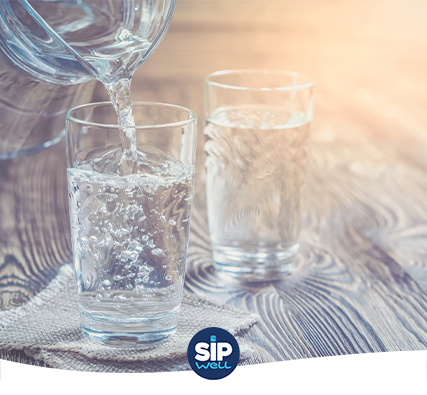Quality of drinking water

Water is life, we all agree on that. It is an essential element in our society. Drinking 1,5l to 2l of water every day is not only better for health but is also a requirement. Those who do heavy physical work or often exercise and thus lose more fluid through perspiration, are recommended to drink enough before and after the difficult activity. Also during hot summer days it is important to stay hydrated throughout the day.
Moreover, water is the ideal thirst quencher. With respect to soft drinks, water contains no fats, no calories and the cholesterol content will not be affected. Drinking a glass of water regularly suppresses hunger and is therefore an ideal slim holder.
Nevertheless, the composition and quality differ greatly from species to species. Water contains all kinds of minerals and other elements. The quality standards that drinking water must comply with are laid down in advance in the Public Health Act.
Types of drinking water
Below the three main types of water:
Tap water
The well-known tap water is brought to our crane via the public water supply network. Due to the legal and regular checks (on various parameters, prescribed by the Ministry of Health), this water is suitable for daily consumption. Certain maximum (eg chlorine) and minimum values (eg calcium and magnesium) are closely monitored here.
Spring water
Spring water comes from a source that is supplied by superficial water layers. The chemical composition of the water is therefore seasonal (depending on climate, precipitation, …). Several components can quickly determine the quality of the water. That is why it is important that the quality is strictly monitored. Most companies that bottle water from source quality do daily strict controls to ensure a constant and tasty water quality.
Natural mineral water
The natural mineral water comes from deeper layers than spring water. The composition of the water is very stable, regardless of the seasonal conditions. This is because the water comes from a strongly defined geological area. The law does not prescribe any standards for mineral water in terms of certain mineral contents and salts. However, mineral water may not be placed on the market without the prior approval of the Minister of Public Health on the basis of the General Food Inspection.
Composition
Our drinking water consists of various elements. The following table shows the maximum standard for our drinking water.
| Maximum drinking water standards (in mg / l) | |||||||||
| Ca | Mg | Na | K | So4 | HCO3 | CI | NO3 | F | Dry residue |
| 270 | 50 | 50 – 200 | / | 250 | / | 250 | 10-50 | 1-1,5 | 500 |
These figures require a word of explanation:
- Calcium (Ca): Calcium is necessary for our bone structure. In addition, calcium also plays a major role in many metabolic functions. Together with magnesium, calcium also determines the hardness of the tap water.
- Magnesium (Mg): Magnesium is responsible for the conduction of nerve impulses to the nerves, stimulates the conversion of carbohydrates and proteins and strengthens the muscles.
- Sodium (Na): Sodium is important for the tissue tension and water management. Mind you, too much salt is bad for your health. A low sodium content is better. After all, sodium is already sufficiently ingested in all kinds of foodstuffs in the form of kitchen salt.
- Potassium (K): Potassium mainly acts on the core of the muscle tissue cells. Together with sodium, it regulates the mineral balance. Potassium also gets enough in through the diet.
- Sulfate (SO4): Too high a sulphate content can be laxative and lead to dehydration.
- Hydrogen carbonate (HCO3): Hydrogen carbonate promotes digestion. It neutralizes the excess acid in our body.
- Chloride (Cl): Chloride together with sodium is responsible for the water balance in the body.
- Nitrate (NO3): Too high nitrate content is bad for health.
- Fluoride (F): Fluorine contributes to the prevention of tooth decay, but too high a level can cause stains on the teeth.
- Dry residue: This is the total content of mineral salts in the water.
Sources:
http://ec.europa.eu/environment/water/water-drink/index_en.html
https://www.vmm.be/water/drinkwater/kwaliteit
http://www.health.belgium.be/nl/voeding/specifieke-voedingsmiddelen/gebotteld-drinkwater/bronwater
http://www.iwva.be/drinkwater/kwaliteit/definitie-drinkwater



 MY ACCOUNT
MY ACCOUNT